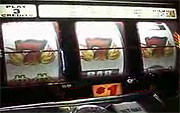
THURSDAY, May 6 (HealthDay News) — In problem gamblers, a near-win triggers an intense response in brain regions associated with reward, which may push them to gamble more, a British study finds.
It included 20 people whose gambling habits ranged from buying the occasional lottery ticket to compulsive sports betting. Researchers used functional MRI to scan the participants’ brain activity while they played a slot machine.
When the two icons on the machine matched and the participants won 75 cents, their brain reward pathways became active. This did not occur when they lost. However, when the slot machine wheels stopped within one icon of a winning match, the brain reward pathways were activated.
“These findings are exciting because they suggest that [near-win] outcomes may elicit a dopamine response in the more severe gamblers, despite the fact that no actual reward is delivered,” study author Luke Clark, of the University of Cambridge, said in a news release. “If these bursts of dopamine are driving addictive behavior, this may help to explain why problem gamblers find it so difficult to quit.”
Strong responses to near-wins were detected in the midbrain, which is packed with dopamine-releasing brain cells and is an area associated with addiction. Near-wins also triggered increased activity in the ventral striatum and anterior insula, brain areas associated with reward and learning.
The study is published in the May 5 issue of The Journal of Neuroscience.
More information
The American Academy of Family Physicians has more about problem gambling.

